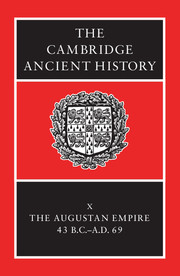13d - Gaul
from 13 - The West
Published online by Cambridge University Press: 28 March 2008
Summary
INTRODUCTION
Caesar's conquest of Gaul fundamentally shifted the balance of the Roman world, up until then based on the Mediterranean, with the single exception of the Black Sea. The ‘new territories’ represented a vast addition to the empire, comprising some 30 per cent of its land area apart from Italy. Exposed to central Europe, and especially to the German barbarians and other groups, amongst them the Cimbri and Teutones, who had already left their mark on Roman history, they stretched to the northern oceans, and to Britain, which Caesar had abandoned, after suffering his only failure. The occupation of the new provinces demanded, in the short term, that the Alps and the Pyrenees be subjugated and that control be established over the Rhine and the Danube. The Gallic Wars had utterly and irreversibly transformed the geopolitics of the ancient world. Conversely, the history of Gaul reflected its new environment, and the new strategic geography formed by the German frontier and the proximity of Britain, with all the attendant social and economic repercussions.
But it is impossible to understand ancient texts or decisions, such as those that created the administrative structure or the road system, if we continue to base our analyses on present-day cartography. It is important to remember that as late as Pliny, and perhaps as late as Ptolemy, geographical knowledge remained extremely approximate. Book IV of Strabo's Geography, devoted to Gaul and completed about A.D. 18, illustrates the point.
- Type
- Chapter
- Information
- The Cambridge Ancient History , pp. 464 - 502Publisher: Cambridge University PressPrint publication year: 1996
References
- 14
- Cited by

